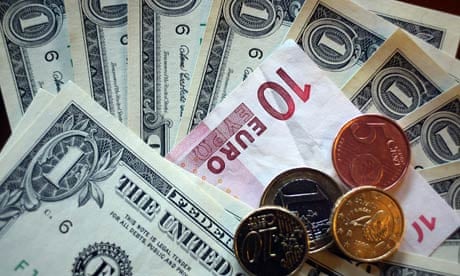Aid from the world's richest donors continues to benefit companies from their own countries, despite decade-old commitments to "untie" aid and hand over control to developing country governments, according to a new report.
Researchers estimate that $69bn – more than half of the total official development assistance – is spent each year buying goods and services for development projects. But much of this money is "boomerang aid" – funds that flow to developing countries only on the books and may never leave the donor countries.
Ten years ago, aid donors pledged to put an end to the "tied aid" scandals that obligated aid recipients to buy from donor country companies. The UK formally untied all development assistance in 2001, with the justification that "tied aid reduces value for money" and tends to lead to inappropriate and expensive projects that do little to tackle the needs of the poorest.
But Tuesday's report from the European Network on Debt and Development (Eurodad), a network of 54 NGOs from 19 European countries, says many countries have reneged on their promises and at least 20% of all bilateral aid remains formally tied.
In 2009, 67% of aid from Greece was given on the condition that Greek contractors were used on development projects. In the same year 54% of Austrian aid was tied, along with 50% of Korean aid and 39% of Portuguese aid.
Meanwhile, two-thirds of formally untied aid contracts still go to firms from rich donor countries, says the report, as developing countries are squeezed out of the equation by powerful transnational companies and complex procurement systems.
"Donor countries continue to mislead their own citizens and those of developing countries, by passing off what is essentially state aid to donor country firms, as a genuine contribution to poor countries' effective development," says the report, which builds on six key case studies from Namibia, Ghana, Uganda, Bangladesh, Nicaragua and Bolivia.
The reliance on companies from rich donors deals a double blow to developing countries, says the report, racheting up the cost of development projects while failing to deliver sustainable social and economic benefits. In contrast, "buying local" would offer a "double dividend", says Bodo Ellmers, lead author of the report, funding development projects that also create jobs, stimulate industries, and provide income opportunities for local communities and firms.
Companies from developing countries are less likely to have the ability to monitor tenders from dozens of donors, each with a different set of criteria to meet and paperwork to fill out, and struggle to gain an edge while larger companies strategically open up offices in key hubs for the global aid industry – such as Washington and Brussels.
Big development banks – including the World Bank – systematically opt for international competitive bidding, notes the report, increasing the chances that large firms from donor countries will win contracts. Half the contract value of World Bank-funded projects in the last decade went to companies from donor countries. In 2008, 67% of World Bank-financed contract amounts went to firms from just 10 countries.
In Uganda, for example, only 18% of the contract value of World Bank-funded projects went to local firms. For contracts valued at over $1m, that share dropped to 11%. Firms from China and the UK won the bulk of large World Bank-funded contracts in Uganda, 32% and 19% respectively.
"This is striking," says Ellmers. "The World Bank gives out loans, so recipient countries have to pay this money back. Where are they supposed to get that money?"
Eurodad's researchers also found no relationship between the cases where donors chose to buy locally and the quality of countries' public financial systems. Donors often argue that they cannot "buy locally" because of inefficiency, corruption, and important financial risks posed by doing business in developing countries.
Information on who benefits from aid-funded contracts has been notoriously hard to come by, as donors are reluctant to disclose details on their deals. While a donor might provide figures on how much aid it is spending on development projects around the world, it is much harder to determine how much of that money actually enters the economies of the developing countries concerned.
Eurodad's report comes as donors face increasing pressure to demonstrate the impact of their aid programmes. As countries prepare to make their way to Busan in South Korea in November for this year's international summit on aid effectiveness, Eurodad hopes the report's findings will help shape the summit's agenda and influence key decision-makers.
Many countries are expected to miss the internationally agreed millennium development goals, despite increasing amounts of aid over the last decade. Though international aid flows remain significantly short of UN targets, official development assistance has increased from $54bn in 2000 to $129bn in 2010.
Eurodad insists real "value for money" will only be achieved if donors engage with companies in developing countries, using aid as a catalyst for local and regional business development and job creation. "Extraordinary efforts are needed to make the most out of every single cent."
